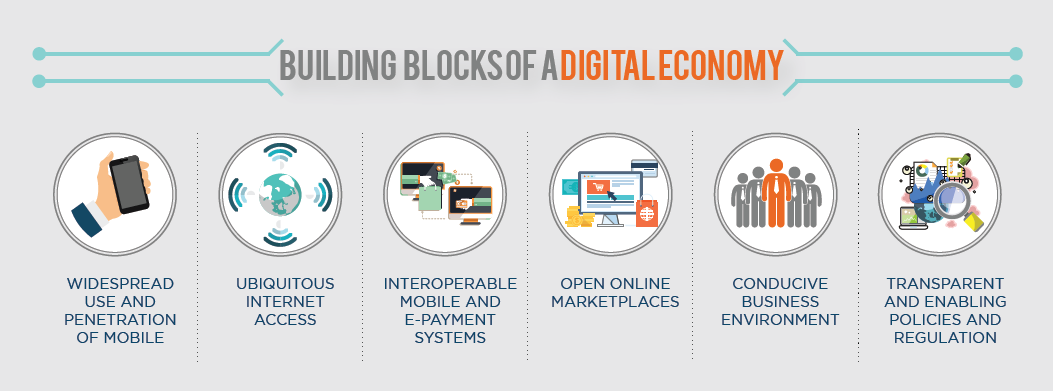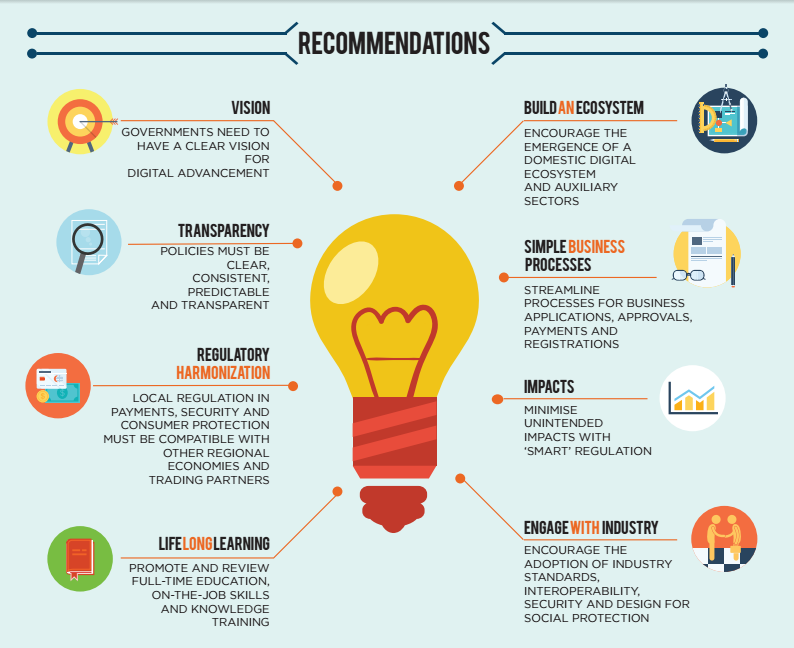

Download PDF (Full Report)
View Infographic


Overview
Asia is in transition. Countries are moving from an Internet economy towards a fully “digital” one, relying upon IP-enabled networks and platforms as part of the embedded infrastructure of society. In light of this transition, TRPC has released a whitepaper, titled “Going Digital”, which examines the status and the future potential of Asia’s digital economy through case studies from 5 countries – Vietnam, Indonesia, Japan, South Korea and India – showcasing how different industries are going online and digitising their front and back-end operations. The white paper identifies how the Internet is being used to both foster this transition, and to rejuvenate and upgrade traditional industry sectors, and through doing so, spurring employment and growth.
Country Snapshots and Case Studies
- India – India’s demographic supports rapid Internet growth but its business climate needs to improve in order to encourage entrants of innovative start-ups.
Case studies:
- Case #1. Zomato gives digital presence to thousands of local eateries, regardless of size and location.
- Case #2. Kanaja.in provides inclusive e-community service and contents for the minority Kannada people.
- Indonesia – Indonesia is soon to become Asia’s 3rd largest e-commerce market and its growing middle class and MSMEs stand to benefit from further digitization.
Case studies:
- Case #1 Doku is an innovative local payment gateway easing the way to e-commerce.
- Case #2 Blanja is an e-commerce platform, which has opened doors for SMEs to enter the global marketplace.
- Japan – Japan has an advanced Internet infrastructure but need to overcome the demographic pressure and inertia from traditional sectors and promote retooling of its population to stay ahead of the digital curve.
Case studies:
- Case #1 JMOOC enables lifelong learning and professional development through online education..
- Case #2 Aeon Agri helps new breed of young farmers use ICT and cloud to manage crops.
- South Korea – South Korea is a world leading digital powerhouse but its traditional sectors that stand to benefit the most face regulatory humps that predate the digital age.
Case studies:
- Case #1 Newsy Stock helps novice investors to invest more wisely.
- Case #2 Baedal Minjok expands business opportunities for mom-and-pop shops.
- Vietnam – Vietnam rapidly became one of the most mobile nations and a nascent digital ecosystem is emerging, led by e-commerce.
Case studies:
- Case #1 NganLuong is building trust on e-payments and commerce for first-time buyers.
- Case #2 GiapSchool is giving over ten thousand people access to free educational material in local language.
To view our infographic and see our recommendations, follow this link or simply click on the image below:


The ‘Going Digital’ Roundtable Series
This series of forums aims to introduce and share the key findings of the Going Digital whitepaper and gather feedback to discuss ways forward at the national level. The forums will bring together a diverse group of stakeholders including senior government officials, leading academics, relevant industry bodies, and private sector representatives.
- Vietnam (Hanoi), 9 Jun, 2015
At the ‘Powering the Digital Economy in Vietnam’ forum, co-organised by the Vietnam Chamber of Commerce and Industry (VCCI) and held at the VCCI Office in Hanoi, Vietnam on 9 June 2015, TRPC is launching the “Going Digital: Status and Future Potential of Internet-Based Economies across Asian Economies” report. In this forum, we look at the opportunities and challenges facing businesses in Vietnam as Internet growth, driven thxrough mobile technologies, plays an increasingly important role in how business models are formed. The forum will explore what can be done to assist businesses as they navigate towards a digital economy.
Download PDF (Full Report in Vietnamese)
- Japan (Tokyo), 24 Aug, 2015
In the forum on ‘Reinventing Japan’s Digital Economy’ (at Keio University on 24 August, co-organised by GLOCOM and TRPC, co-sponsored and hosted by APRU’s Internet Summer Seminar) we look at examples of traditional sectors from across the region that have gone through, or are in the process of, digital transformations. We will identify and discuss the challenges still facing Japan as it aspires to fully transition towards a digital economy.
Download PDF (Full Report in Japanese)
- Indonesia (Jakarta), 8 Sep, 2015
The Indonesian Government is currently formulating a comprehensive e-commerce roadmap. It is therefore timely to hold a multi-stakeholder discussion on the potential opportunities and challenges involved in accelerating the transition toward a digital economy. What lessons can be learned from successful entrepreneurs who have built the nascent digital ecosystem? What market and regulatory constructs may inadvertently impede progress? What do various industries need to see in the way of digital enablement? What levels of investment can the market expect to see in in e-commerce and beyond in the next few years? These are some of the questions this forum on ‘Powering Indonesia’s Digital Economy’ on 8th September 2015 at The Pullman Thamrin Hotel in Jakarta will seek to explore.
Download PDF (Full Report in Bahasa Indonesia)
- South Korea (Seoul), 4 Nov, 2015
What lessons can we extrapolate from digital entrepreneurs that have rejuvenated traditional sectors and gone regional? What are the current constraints in human resources, market and regulatory landscapes that impede digitisation and globalisation for Korean businesses? What more can be done to assist SMEs and start-ups as they try to hone their digital competitiveness? These are some of the questions that will be discussed at the “Going Digital, Going Global” Forum on 4th November 2015 to be held at Maru180, Seoul Korea.
Download PDF (Full Report in Korean)
- India (Jaipur), 22 Jan, 2016
At the Internet and Mobile Association of India (IAMAI)’s Startup Summit on the 22nd of January 2016, held at the Clarks Amer Hotel in Jaipur, we will present a special address on the key findings of the “Going Digital” report. We will look at some of the success factors behind start-ups like Zomato, which have found international success, as well as the challenges in starting up public community websites. Lastly, we discuss what are the remaining challenges facing start-ups in India, and what are some of the areas for improvement in terms of providing support.
Download PDF (Full Report in English)
TRPC wishes to thank Google for their support and funding for this research. TRPC also acknowledges Anirudh Balakrishnan (NASSCOM), Anti Ariandini (idEA), Tomoaki Watanabe (Glocom), Nami Chung (Asan Nanum Foundation), and Le Van Loi (VCCI) for their advice and support. This research has been conducted independently, with a focus on accuracy and neutrality. TRPC alone remains responsible for the accuracy of information and views expressed therein, which do not necessarily represent the views of Google or any other party.